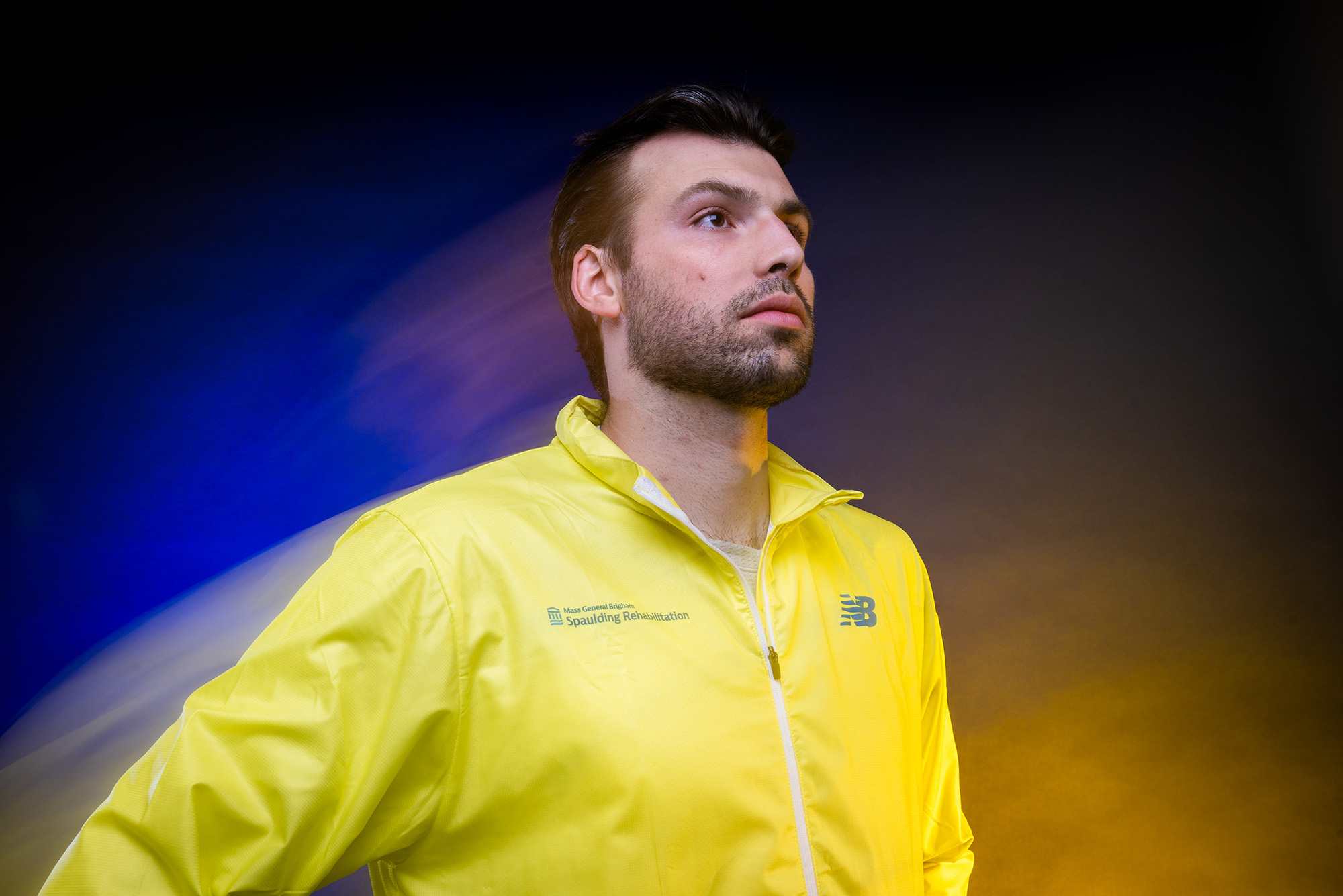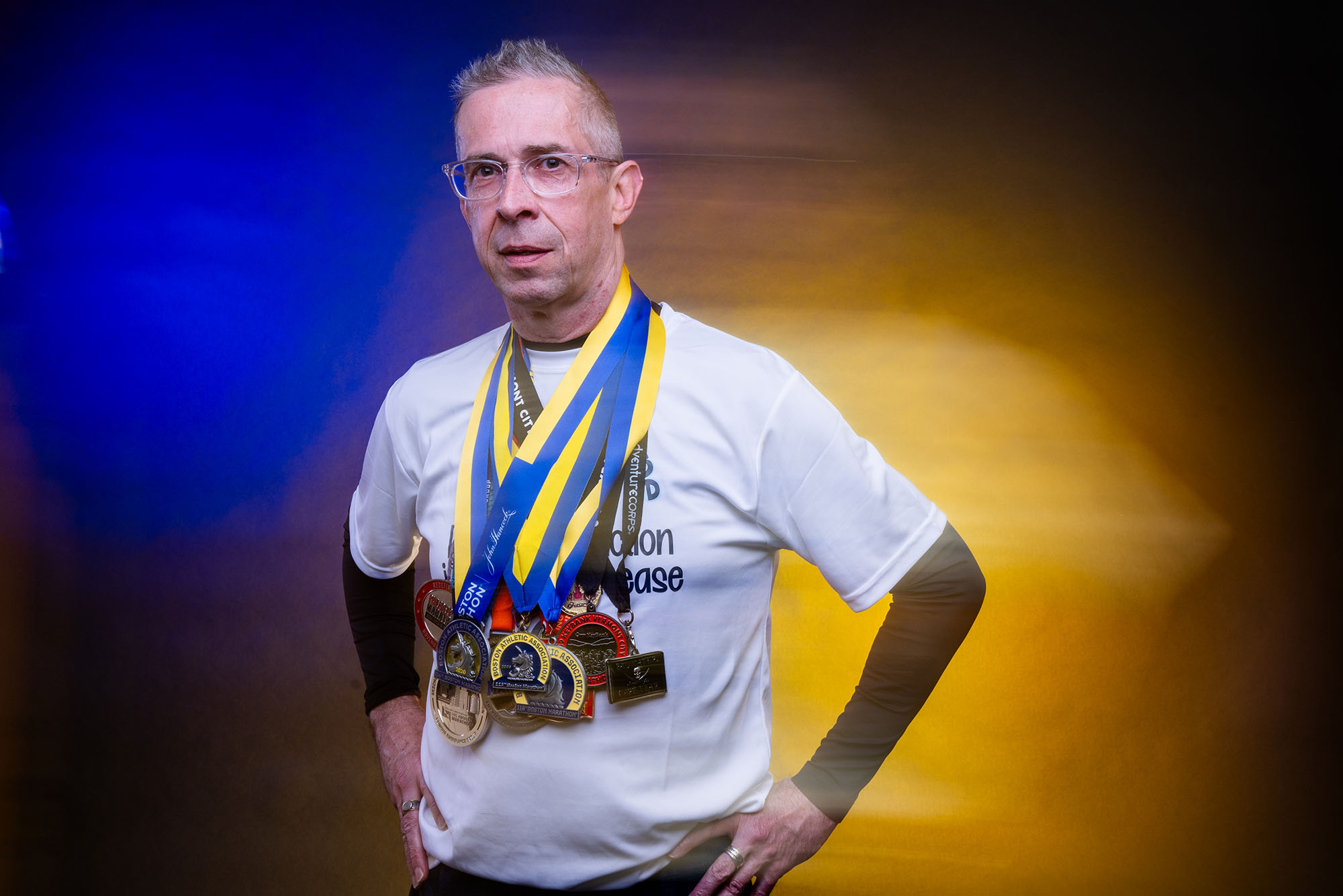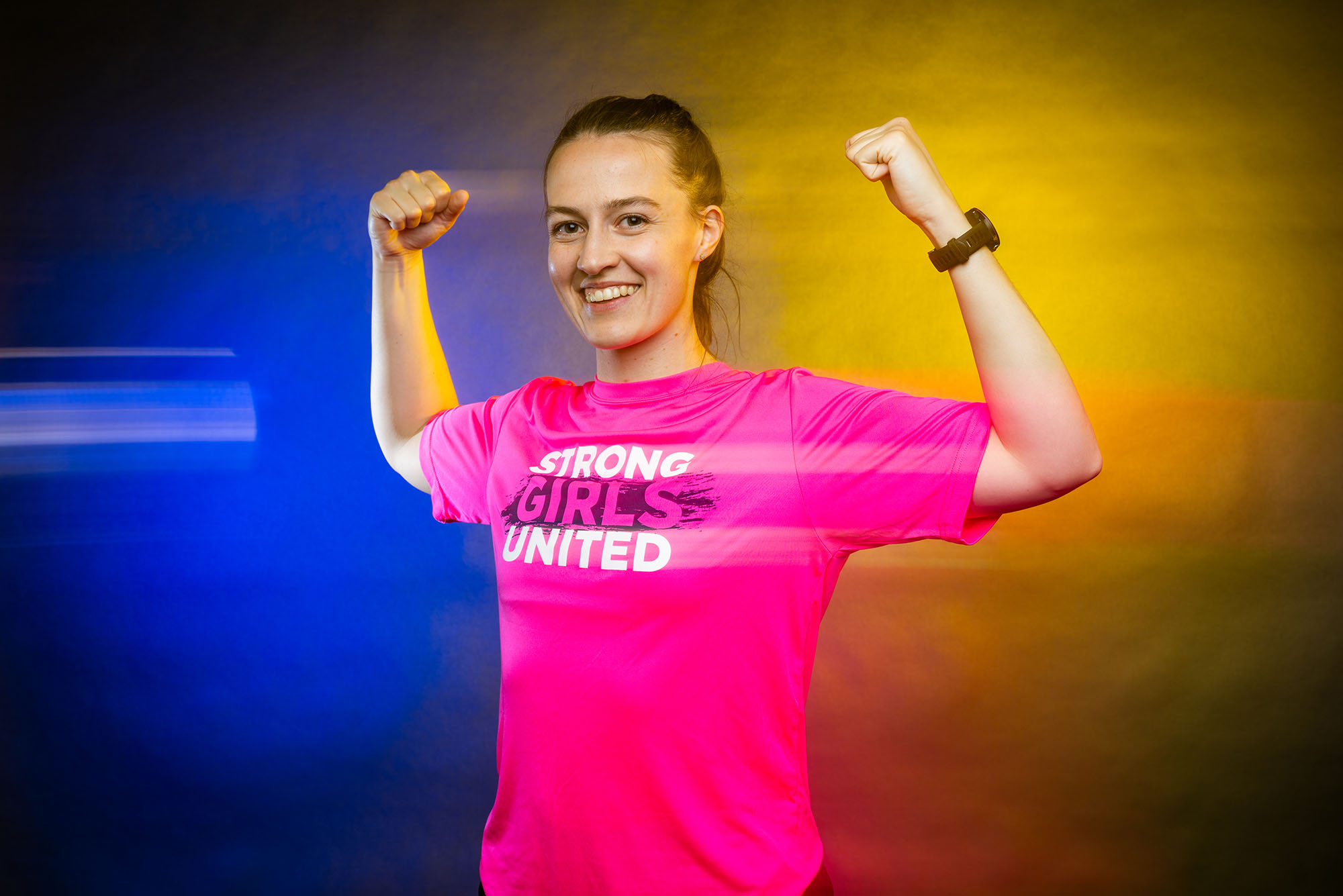Six BU Runners Share Their Boston Marathon Charity Stories
They are running the historic race for cancer, for rehab, for addiction, for girl empowerment, for others, and for themselves

Sean Mueller lost his best friend and hero, his father, Peter, in December 2022 due to a battle with illness. After Peter Mueller passed away, his son decided to run the Boston Marathon in support of Dana-Farber Cancer Institute, which treated his dad “as if he were a rock star.” Photo by Cydney Scott
Six BU Runners Share Their Boston Marathon Charity Stories
They are running the historic race for cancer, for rehab, for addiction, for girl empowerment, for others, and for themselves
Marathon Monday is a uniquely Boston day—the spring air has finally arrived, the Red Sox will gear up for a rare 11 am first pitch, and of course, an estimated 30,000 runners will take off from Hopkinton, Mass., on April 15 to make the 26.2-mile trek to Copley Square.
Over 22,000 runners entered the race by surpassing a qualifying time based on their age group. The rest of the field consists of runners participating in the Bank of America Boston Marathon Official Charity Program—including many Boston University community members. If these athletes raise the minimum of $5,000, they are eligible to run for an approved charity. Six Terriers share their stories of why they are participating and why their charity is meaningful to them.
Mark Sibold (LAW’25)

One left turn changed Mark Sibold’s life.
The BU school of Law student was visiting friends in upstate New York about 11 months ago when he decided to go on a bike ride. Toward the end of the trip, Sibold took a left turn and was hit by a car going about 60 miles per hour, breaking “basically every bone” in his body.
Sibold regained consciousness six days later and spent two weeks in the ICU before transferring to Spaulding Rehabilitation Hospital in Charlestown, Mass. One EMT told him that in 30 years, he had never seen anyone survive the injuries Sibold endured.
“That’s where my story running the Marathon picks up,” Sibold says. “I’ve done a few marathons before, but I was in a wheelchair the entire summer. I was like, ‘When I get back, I really want to run the Marathon.’”
The recovery process for Sibold involved relearning tasks as seemingly simple as getting into the shower, tying his shoes, or scratching the other side of his back.
“The main thing I learned is that I took so much for granted,” Sibold says. “Every single activity that I was able to do again was like a new sort of milestone for me. I was like, wow, today I got out of bed.”
He first started walking last August. He didn’t run until October, but even then, it was a slow buildup. The training started with running for just one—painful—minute, walking for four minutes, and repeating. Then, he would run for two minutes, then five minutes, pushing himself with each week.
Sibold’s reasons for running the Marathon are twofold. On one hand, he wanted to prove to himself that he has recovered. On the other hand, he wanted to honor all the patients at Spaulding Rehabilitation Hospital who aren’t going to be able to run.
“I knew that I was going to get better, but they maybe weren’t. I was going to be able to walk again, I was going to be able to run again. But they weren’t,” Sibold says. “I want to run the Marathon to raise money for Spaulding, so they can continue to do research, hopefully help those patients walk or run or whatever, so they can enjoy their life.”
Caleb Daniloff

Overwhelmed after years of struggle with a child suffering from substance use disorder, Caleb Daniloff knew he couldn’t continue alone. Just like his child, he was being consumed. He needed an outlet.
“Addiction is a family disease,” Daniloff says. “A lot of parents will say, certainly in the early days when they’re desperately trying to solve this problem, that they become addicted to their kid’s addiction.”
Daniloff, a communications and marketing writer at BU for over 16 years, and his wife didn’t have a lot of people to talk to about the issue. Shame and stigma kept them quiet around friends, family, and coworkers. While it was all they thought or talked about to each other, they mostly kept it bottled up.
That was until they found Learn to Cope, a peer-led support network for families dealing with an addicted loved one.
“When we went to that first support group meeting, for me it just all kind of spilled out,” he says. “I did think that people were going to look at us and our situation like it was insane, and then I realized it was pretty much what everyone else was going through, and that was really comforting.”
His child has now been in recovery for several years and is doing well, but Daniloff and his wife are still involved in Learn to Cope. Daniloff started a writing group for parents, while his wife is a meeting facilitator.
He is also running the Marathon for Learn to Cope.
He has run 20 marathons and ultras, and this year will be his fourth Boston Marathon. During his family’s 12-year struggle, Daniloff often ran at the Middlesex Fells Reservation with his daughter’s dog, Hank, as a means of escape. He wrote about the experience last year for Runner’s World.
“I treated it as a sanctuary,” he says. “I have my own history with alcoholism and drug abuse, and when I got sober, running played a big part for me. It’s always been a coping tool for me, a mental health tool.”
Daniloff says running the Boston Marathon for the support group is a great way to bring attention to the disease of addiction and its impact on families, sending the message that “You are not alone” and “We can do hard things.”
“The Marathon ultimately is a celebration of life,” Daniloff says. “It’s very communal, and Learn to Cope is very much a communal power.”
Katie Shannahan (ENG’20)

Katie Shannahan didn’t play girl’s hockey until she was 15.
Her father was in the Air Force, and through all the moves across the country, sports were one constant in her life. The places she moved to weren’t always “hockey hotbeds,” as she puts it, causing her to play for the local boy’s hockey teams since it was the only option—an oftentimes hostile environment.
“Back then boys, and sometimes even parents, weren’t always welcoming to girls playing either. I had to get dressed in janitor’s closets, women’s bathrooms, or whatever corner they could find,” Shannahan says. “My ponytail often made me a target for the opposing team.”
When she was 15, Shannahan joined a girl’s team in Denver, an hour and a half drive from her house. Then she moved to Michigan to continue her playing career before putting on the scarlet and white for BU. Playing for the Terriers, Shannahan was part of the 2019 Beanpot-winning team, in addition to making lifelong friends and earning a great education.
“Playing hockey for Boston University was an absolute dream come true. It was everything I hoped it would be and more,” she says. “I’ll never forget the first time I put on the jersey or the last time I took it off. BU will forever hold a place in my heart.”
The Boston Marathon is Shannahan’s first marathon, and she is raising money for Strong Girls United (SGU), a charity that empowers girls to be “strong, confident, and resilient through sport and physical activity,” according to its website.
Shannahan volunteered as a female athlete mentor for SGU and recalls being paired with a fourth-grade hockey player. She says she had fun hearing the girl give a rundown of her games or something funny that happened on the ice.
“They get the girls involved in athletics, teach them mental skills, and provide mentorship,” Shannahan says. “Sports are the reason I have been able to accomplish many of my goals in life. I want younger women to have those same opportunities.”
Professional women’s athletics are a burgeoning field, including the new Professional Women’s Hockey League, which has sold out NHL arenas in its inaugural season.
“Young girls have the ability to dream of playing pro now, something I never had,” notes Shannahan. “I’m very excited to see women’s sports continue to grow. There is so much more to come!”
Aaron Stevens

Aaron Stevens’ office at Questrom School of Business is a collage of running paraphernalia, from the 31-pound medal he earned for finishing the 2020 Little Rock Marathon to the picture of him after running his first marathon, the 2014 Chicago Marathon.
Stevens, a College of Arts & Sciences computer science lecturer and a Questrom finance lecturer, has run 68 marathons so far—a reality few believed would be possible when he was growing up.
“Nobody ever said you can do this. In fact, probably people implicitly said, you can’t do that,” Stevens says. “My gym teacher in high school said, ‘Yeah, you’re the fat kid. You can’t do this.’”
Stevens was “really overweight,” as he puts it, in high school, dealing with a lifelong food addiction. He would often try running, but work, sickness, or injury would deter him from continuing. He then met with a doctor and changed the way he ate, losing 90 pounds in the process.
“I wanted to lose weight. There’s nobody who’s overweight who doesn’t want to lose weight,” Stevens says.
He recalls the first time he ran for an hour. It was 2013 on a trail in Montreal, and he says he was having so much fun, he just kept going. This led to his first half marathon, and eventually his first marathon, in Chicago in 2014.
“Even the first half marathon, I cried when I crossed the finish line because this was not something that anybody had told me I could do,” Stevens says. “I meet with students [who say], ‘Oh, I could never do that.’ Yes, you can. Absolutely you can do that. All you need to do is get started.”
This year, Stevens is running the Boston Marathon for the Dana-Farber Cancer Institute. He first learned of the institute when his cousin was diagnosed with colon cancer. His mother and father both were affected by cancer, as well. Running the Marathon is his way of showing support.
“There’s nothing I can do to help them directly. I’m a dropout when it comes to chemistry and biology,” Stevens says. “So, the one thing I can do is I can use my passion about marathon running to talk about it with everybody I meet and encourage them to donate money for cancer research.”
Em Gibb (Sargent’10)

Em Gibb’s bucket list will have one less item after Monday.
Gibb is a Massachusetts native and has stood on the sideline at Marathon Monday since her time as a student at BU. Now an athletic trainer who works primarily with the BU women’s hockey team, she has been both a medical volunteer and a spectator for the Marathon. For the past four or five years, Gibb has watched from her usual spot at Bullough’s Pond in Newton, marveling at the way the race brings the community together.
Gibb recalls seeing a participant’s wheelchair break down last year. Immediately, multiple spectators ran to their houses to grab tools and spare parts, fixing up the wheelchair so the participant could finish the race.
“That moment to me was everything about what the Marathon represents—it’s a sense of community so awesome that you truly have to be in it to get it,” Gibb says. “I decided on my walk back home that next year was my year—and here we are!”
Knee issues have deterred her in the past, so this will be Gibb’s first Marathon. She has put together a mileage plan that works for her. And with the support of the hockey team and fellow athletic trainers, she feels ready for Monday.
“I would absolutely not have had a successful training cycle without all of their support and help,” Gibb says. “The nice thing about your first marathon is that, no matter what, it will be a [personal record], so I just keep telling myself to enjoy the moment and not be focused on the result.”
Gibb is running for Mass Eye and Ear because their mission resonates with her, and she wants to help those with serious vestibular and ocular disorders. Her best friend from college, Michelle Carson (Sargent’11,’13), is also running for the team, making it even more special.
“It definitely makes it about more than just you,” Gibb notes. “The model of the charity teams is a brilliant one because you get to live your dream of running this special race while also getting an opportunity to do so much good for so many organizations.”
Sean Mueller (Questrom’13, SPH’24)

Sean Mueller’s father, Peter, encouraged him to go to Boston University in 2009 and encouraged him to return in 2020, where he is now a doctoral candidate. Peter was much more than just Sean’s father. Whether it was a stressful exam or an athletic aspiration, he was there and supportive of his son.
“My father was not just a parent, but also my hero and best friend, and I miss him every day,” Mueller says. “The transformation from the robust life-of-the-party figure he once was to a state of vulnerability due to his illness left a lasting impact on me as I reflected on health, life, and resilience.”
Peter battled a condition that took him to the Dana-Farber, where Sean would accompany him to his treatments until he passed in December 2022.
Sean witnessed the empathetic care the Dana-Farber Cancer Institute provided to his father and all patients, galvanizing him to run the Marathon in support of them this year.
“I witnessed firsthand the exceptional care and attention he received. The staff at Dana-Farber treated him with an extraordinary level of respect and kindness, as if he were a rock star,” Mueller says. “This experience not only affected how I cope with personal loss and adversity, but also left me with a profound respect for healthcare professionals.”
Monday will mark the first marathon that Sean has ever run. While he has been active his entire life, he says there’s a reason he ran the 400-meter during track instead of the distance events that seemed “painstakingly monotonous.” Before training for the Marathon, Sean had never run 10 miles consecutively.
The marathon training has come with hurdles for Sean, such as carving out time to run six days per week as well as enduring “screaming” calves. However, running in memory of his father and for Dana-Farber has pushed him past these obstacles.
“Running in memory of my father, I am reminded that this endeavor is bigger than just me—it’s a tribute to him and a testament to pushing beyond limits for something meaningful,” Mueller notes. “I wish more than anything that I could share this marathon journey experience with him, knowing how much he cherished being part of my challenges.”
With eight combined years as a Terrier, Mueller has witnessed several Boston Marathons, and he says one of his favorite aspects is how the community rallies behind the holiday. On Monday, he says, viewers should be on the lookout for a runner with a big beard and a pink Dana-Farber pinny.
“I can’t wait to be willed to finish the marathon as I make my way through South Campus via Beacon Street,” Mueller says, “and finally into Kenmore Square, where I would always watch the Marathon.”
Comments & Discussion
Boston University moderates comments to facilitate an informed, substantive, civil conversation. Abusive, profane, self-promotional, misleading, incoherent or off-topic comments will be rejected. Moderators are staffed during regular business hours (EST) and can only accept comments written in English. Statistics or facts must include a citation or a link to the citation.